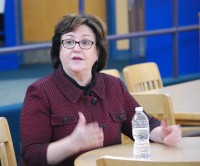State Education Commissioner Speaks in White Plains

By Andrew Vitelli – New York State Education Commissioner MaryEllen Elia spoke to parents, teachers, and school board members in White Plains last Monday, with student testing and teacher evaluations dominating the discussion.
Elia, who has held the position since July 6 of last year, listed Common Core Learning Standards and their troubled roll-out, student assessment, and yearly teacher evaluations (called the Annual Professional Performance Review, or APPR) as some of the issues that had strained the relationship between educators and the state.
“I think it’s important for us to be reasoned as we’re moving and not do things without getting lots of people involved in it, and to be able to talk through those issues,” Elia explained, acknowledging the state had not sufficiently sought out the input of teachers while implementing changes in recent years. “That’s the best way that I know to restore confidence.”
Elia stressed the importance of teacher involvement in formulating performance evaluations as well as on deciding which questions would be used on standardized tests. The state decided last July not to extend its contract with Pearson, the London-based education conglomerate, which had been tasked with developing its English language arts and math tests for students in third through eighth grade. Elia said that Pearson, whose test questions came under scrutiny in recent years, did too little to include teachers in formulating and selecting the questions, though they did allow a panel of teachers to weigh in.

“They didn’t feel valued in the process,” Elia said of the teachers on the panel. “Even though they could give the feedback, they didn’t feel like people were listening.”
In July, Questar Assessment Inc. was awarded a five-year contract to develop the assessments. Teachers will now be able to reject questions they feel are not appropriate, Elia said, and in future years New York State teachers will be the ones who develop the test questions.
Questions about standardized testing have led to growing numbers of students “opting out” of the tests, with 20 percent of third through eighth graders refusing to sit for the exams last year, according to state officials. In addition to the changes in selecting questions, Elia said the tests have been shortened, with fewer questions and fewer reading passages.
“I think that’s a first step,” Elia said. “What we ultimately want to do is get them to where they give us feedback and they’re long enough to do that but not so long that they’re onerous. And there’s a balance there.”
Elia also addressed concerns that teacher evaluations, specifically the APPR, placed too much importance on student test scores. Following criticism, the state Board of Regents voted in December to place a four-year moratorium on the use of such test scores in evaluating teachers, following the recommendation of a task force established by Gov. Andrew Cuomo. Elia, a member of the governor’s task force, stressed the decoupling of the teacher evaluations and their students’ test scores for the next three years, but said the assessments could play a positive role for teachers if they are involved in the process.
“A true evaluation system that is productive, I believe, should have teachers feeling like, ‘I need to know where I am so I can get better,’” said Elia. “This system hasn’t done that.”
Elia echoed Gov. Cuomo in criticizing the state’s rollout of the Common Core Standards, saying the process lacked public involvement. She added that curriculum materials and materials provided on the state’s website were insufficient, leaving teachers without the resources necessary to adapt to the new standards.
Questions touched on students with developmental disabilities, variances received by districts, and state funding, which one questioner called the “elephant in the room.” Kerry Broderick, the President of the White Plains Teachers’ Association, said she believes teachers have been punished because of a lack of supervision, with Elia registering her agreement.
“How do we just end this? How do we just say ‘Stop the madness’?” Broderick asked Elia. “Take the test scores off the table altogether for the next three years. We really need to move in that direction.”
Overall, parents and teachers appeared receptive towards Elia, who sought to find common ground by acknowledging the difficulties facing educators and the need for coherence on the part of the state. Bill McGuinn, who runs the Inclusion program at Eastview Middle School in White Plains, received polite applause after thanking Elia.
“Listening to you here today, a number of the things you said rang true,” McGuinn said. “It appears you’ve brought a modicum of common sense back to the process that may have been missing up until now.”
Elia, a native New Yorker, worked for 16 years as a teacher in the Sweet Home Central School District outside Buffalo before moving to Florida and moving over to the administrative side. From 2005 to 2015, she served as the superintendent of schools in Hillsborough County, Fla. Her current position was previously held by John King Jr. from 2011 to 2015. King is now the U.S. Secretary of Education.

Examiner Media – Keeping you informed with professionally-reported local news, features, and sports coverage.

